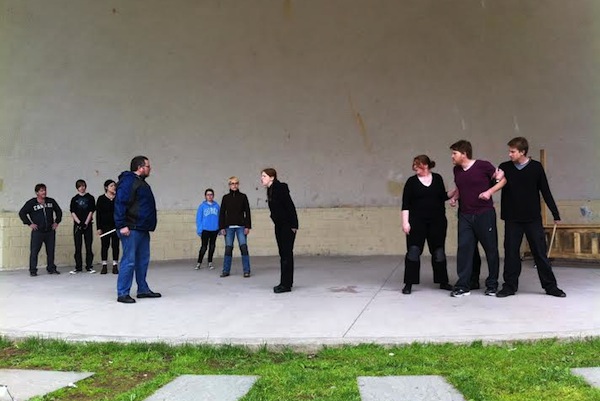
“I wanted to get more involved so I approached Bonnie MacLeod and Mark Delaney (the artistic directors of the Bandshell Players) last summer about the possibility of directing a show with them this year,” she recalls.
Between making that commitment last summer and taking up her directorial duties this spring, Blanchard directed a multi-award winning production of Chekov’s A Proposal for the Boardmore Theatre’s Elizabeth Boardmore One-Act Play Festival in March.
Blanchard says about Cymbeline, one of Shakespeare’s lesser known works, “It’s action packed in that sense and every character has something precious at stake which all collides together in the end. It’s also a sort of ‘greatest hits’ in that we can identify characters similar to those in other Shakespeare plays with a full complement of typical Shakespearean tricks so there really is a little bit of something for everyone – strong heroes and villains, music and spectacle, and a big battle at the end.”
She notes, “Although Cymbeline is the title character we don’t actually spend much time with him. Instead, the play follows a number of characters (including his daughter and her husband, the queen and her son, some gentlemen of Rome, and a group of wildings hiding out in the woods) and how Cymbeline’s actions have impacted them and intertwined their fates.”
“I was interested in directing a play that had social relevance,” Blanchard says about what drew her to this play. “Cymbeline stood out initially as a love story gone wrong with an adventurous and redemptive storyline. But at its simplest, it’s a play about how men treat women and by extension themselves.”
She adds, “It touches on many topics that have been in news headlines repeatedly, some very heavy ones like violence against women, but also some really positive things like standing up for each other and letting the truth of a situation come to light. In true tragedian form, it doesn’t necessarily provide all answers but it offers an opportunity for a sense of catharsis – to release some of that pent up and often conflicting energy to clear the air. I also liked that it was an experimental play for Shakespeare which blends comedy and tragedy together, mixing the good with the bad, so to speak.”
Blanchard notes that Cymbeline is rarely done in its original form.
“Not only is it long but it has quite an elaborate plot,” she says. “One of the first tasks in adapting it was to condense it into a shorter length which was pretty daunting given the complexity of the interweaving plotlines. A number of characters were cut, scenes were merged together or shifted into a different order to maintain the urgent pace of the story, conversations were compressed into compelling monologues which reinforce the actions of characters involved.
“Some language was simplified and new text added with intent to stay true to the spirit of the play while making it a bit more accessible. I left in certain elements that other adaptations normally cut out and tightened the plot lines to reflect the more ensemble nature of the story. I also mixed in selections from a refinished version of the final act by George Bernard Shaw which confronts some of the themes more head on while adding a certain amount of humour to break the tension that has been building over the course of the play.”
Blanchard says that one of the challenges about producing Cymbeline for the outdoors were the elements like weather and passing traffic that are beyond the control of the players and the director.
“It can be very distracting, not just for the audience but for the performer as well,” she observes. “We’ve tried to make the play as dynamic and engaging as possible and as a result I think this has lead to a very compelling performance. The goal with the production design was to create an atmosphere where almost anything could happen and to use the location to its fullest–simple set pieces can transform into a number of locations, costumes are quickly put on or taken off as the actors step in and out of their characters (some play more than one), and the action happens from all around the audience from different directions.”
The play involves quite a bit of stage combat which Blanchard says was both a challenge and some fun.
“I enlisted Todd Pettigrew to choreograph the actual swordplay,” she explains. “It was one of the things we started with very early in the rehearsal process to give everyone some time to feel confident with the physicality of it and the complexity as it does involve the entire cast. I’m really happy with how it’s all come together and think it will be a real treat for the audience to see.”
The Cymbeline cast includes Pettigrew, Bonnie MacLeod, Rachael Murphy, Amber Tapley, Connor Charron, Jenna Lahey, Mark Delaney, Jule Ann Hardy, Kristen Woodford, Dave Petrie, Sam White, Jonathan Lewis, and Jenn Tubrett with stage management by Anna Spencer with assistance from Rochelle MacQueen.
With a six week rehearsal schedule, Blanchard is proud of her cast and crew for the work they have put into the production.
“Each day they grow more in their characterization and their strengths as performers blend and complement each other really nicely,” she says.”I’m really excited about opening night and seeing them share this with an audience and very grateful for their willingness to in tackle this adaptation.”

